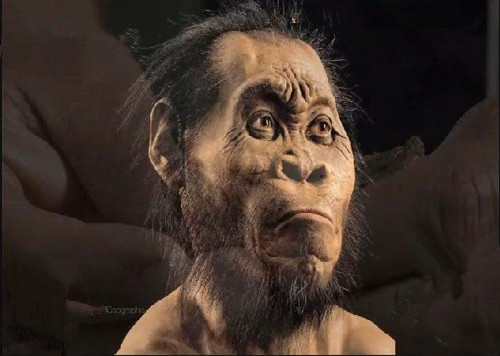CNN News:一名教授称在南非发现新的人类物种
- 参考译文
- 听力原文
From Japan, we're moving over to South Africa where a professor claims to have discovered a new species of human relative.
我们把视线从日本转移到南非,一名教授称在南非发现了新的人类物种。
In 2013, an amateur caver found a fossilized jawbone deep in an underground chamber. It led to the largest discovery of its kind in the continent of Africa. And the director of the recovery expedition says the find turns science on its head.
2013年,一名洞穴探查爱好者在一个地下室里发现了一个颚骨化石。该项发现促使了非洲大陆最伟大的发现。并且该发现的负责人称,在这项发现打开了科学研究之门。

PROF. LEE BERGER, UNIVERSITY OF WITWATERSRAND: This is like opening up Tutankhamen's tomb.
LEE BERGER,教授,金山大学:这就像打开了图坦卡蒙(埃及法老的名字)的坟墓。
DAVID MCKENZIE, CNN CORRESPONDENT : Berger and his team of scientists say they've uncovered a new species of the human family tree.
大卫·麦肯齐,CNN 记者:Berger和他的科学团队称他们已经发现了一种新的人类家谱。
They call it Homo naledi.
他们将它称为 Homo naledi。
What they found was extraordinary -- a chamber of more than 1,500 fossilized bones, coming up with the controversial conclusion that this is a burial ground, and that Home naledi could have used fire to light the way.
他们的发现非常让人吃惊——地下室里有1500多个化石骨头,这样有争议的结论就产生了这是一个坟地? Home naledi 曾经使用火把来照路?
(on camera): That's extraordinarily human-like.
视频:这和人类的行为非常的相似。
BERGER: It is in part superficially, short fingers, long thumb.
BERGER:表面上看来,是手指短,拇指长。
MCKENZIE : Homo naledi is not human, but at times comes close.
MCKENZIE: Homo naledi不属于人类,但是,有些方面已经和人类很接近。
The original fossils are a strange mosaic of ancient and surprisingly modern, a brain no bigger than an orange, but feet almost identical to ours.
这些原始的化石是对古代和现代神奇的镶嵌,大脑和橘子般大小,但是脚的尺寸却和我们相似。
(on camera): And every one of these tells a story.
视频:每一个化石都可以讲述一个故事。
BERGER: Every one of them is a mystery to science.
BERGER:每一个都是一个科学之谜。
MCKENZIE : And leaves many unanswered questions. They haven't been able to date the fossils yet, so Homo naledi may have lived tens of thousands of years ago or even millions.
MCKENZIE:并留下了许多未解之谜。目前研究人员尚不能追溯这些化石的年代,所以,Homo naledi可能生活在数万年以前,也有可能生活在数百万年以前。
AZUZ: Or maybe not. As you heard, still a lot of questions about this and some anthropologists are skeptical about whether it's a newly discovered species at all. They say it looks like one that was first identified in the 1800s.
AZUZ:可能两者都不是。你刚刚也听到了,还有很多的问题有待解决,有些人类学家怀疑,这到底是不是一个新的人类物种。这些人类学家称,这些化石看起来和最初发现的18世纪化石很相似。
There's also doubt about whether the location is really an ancient burial ground. Either way, it has scientists talking and theorizing worldwide.
关于该地址是否是一个古老的墓地,尚有疑问。无论哪种方式,都有自己的科学说法和全球理论。
From Japan, we're moving over to South Africa where a professor claims to have discovered a new species of human relative.
In 2013, an amateur caver found a fossilized jawbone deep in an underground chamber. It led to the largest discovery of its kind in the continent of Africa. And the director of the recovery expedition says the find turns science on its head.
PROF. LEE BERGER, UNIVERSITY OF WITWATERSRAND: This is like opening up Tutankhamen's tomb.
DAVID MCKENZIE, CNN CORRESPONDENT: Berger and his team of scientists say they've uncovered a new species of the human family tree.
They call it Homo naledi.
What they found was extraordinary -- a chamber of more than 1,500 fossilized bones, coming up with the controversial conclusion that this is a burial ground, and that Home naledi could have used fire to light the way.
(on camera): That's extraordinarily human-like.
BERGER: It is in part superficially, short fingers, long thumb.
MCKENZIE : Homo naledi is not human, but at times comes close.
The original fossils are a strange mosaic of ancient and surprisingly modern, a brain no bigger than an orange, but feet almost identical to ours.
(on camera): And every one of these tells a story.
BERGER: Every one of them is a mystery to science.
MCKENZIE : And leaves many unanswered questions. They haven't been able to date the fossils yet, so Homo naledi may have lived tens of thousands of years ago or even millions.
AZUZ: Or maybe not. As you heard, still a lot of questions about this and some anthropologists are skeptical about whether it's a newly discovered species at all. They say it looks like one that was first identified in the 1800s.
There's also doubt about whether the location is really an ancient burial ground. Either way, it has scientists talking and theorizing worldwide.
- 频道推荐
- |
- 全站推荐
- 推荐下载
- 网站推荐




















